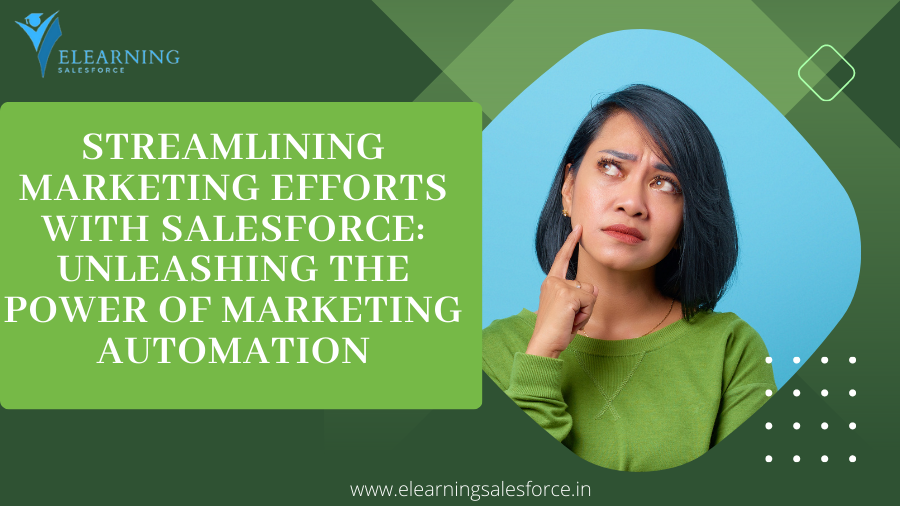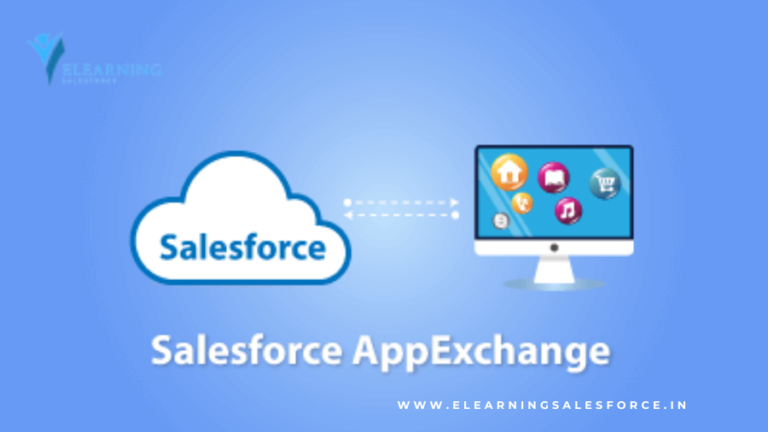Streamlining Marketing Efforts with Salesforce: Unleashing the Power of Marketing Automation
Introduction: In the modern business landscape, effective marketing plays a crucial role in driving growth and success. However, as customer expectations continue to evolve, marketers face the challenge of delivering personalized and timely experiences at scale. Marketing Automation with Salesforce emerges as a powerful solution to streamline marketing efforts, nurture leads, and enhance customer engagement. In this blog, we will explore the concept of Marketing Automation with Salesforce and its transformative impact on marketing strategies.
Understanding Marketing Automation with Salesforce
Marketing Automation is the use of technology to automate repetitive marketing tasks and workflows, allowing marketers to deliver targeted messages and nurture leads throughout the customer journey. Salesforce, as a leading CRM platform, provides robust marketing automation capabilities through its Marketing Cloud and Pardot offerings.
- Salesforce Marketing Cloud: Designed for B2C marketers, Salesforce Marketing Cloud enables businesses to deliver personalized and consistent marketing messages across various channels, including email, social media, mobile, and web.
- Salesforce Pardot: Catering to B2B marketers, Pardot focuses on lead generation and nurturing, enabling organizations to automate and optimize marketing efforts throughout the sales funnel.
Key Benefits of Marketing Automation with Salesforce
- Enhanced Lead Nurturing: Marketing Automation allows marketers to create targeted and personalized campaigns that nurture leads based on their behavior, interests, and engagement level. This increases the likelihood of converting leads into customers.
- Increased Efficiency and Productivity: Automating repetitive tasks such as lead scoring, email marketing, and social media posting frees up valuable time for marketers. This enables them to focus on more strategic activities and drive marketing innovation.
- Improved Customer Engagement: By delivering relevant content at the right time, Marketing Automation fosters meaningful interactions with customers. This strengthens customer relationships and encourages brand loyalty.
- Multi-channel Marketing: Salesforce Marketing Cloud enables seamless integration across multiple channels, ensuring a consistent brand experience across email, mobile, social media, and more.
- Data-driven Decision Making: Marketing Automation provides valuable insights into campaign performance, customer behavior, and conversion rates. Marketers can leverage this data to make informed decisions and refine their strategies.
Marketing Automation Strategies with Salesforce
- Lead Scoring and Segmentation: With Salesforce Pardot, marketers can assign scores to leads based on their interactions and engagement with marketing content. Lead scoring helps identify the most promising leads, while segmentation allows for targeted campaigns based on specific criteria.
- Drip Campaigns and Email Marketing: Salesforce Marketing Cloud facilitates the creation of automated drip campaigns, where a series of emails are sent to leads at predetermined intervals. This ensures consistent communication and keeps leads engaged throughout their journey.
- Personalization: Marketing Automation enables dynamic content creation, allowing marketers to tailor messages and offers to individual preferences and behaviors. Personalization enhances the customer experience and drives higher engagement.
- Automated Social Media Marketing: Salesforce Marketing Cloud allows marketers to schedule and automate social media posts, ensuring a consistent presence across different platforms and reaching a broader audience.
- Marketing Analytics and Reporting: Salesforce provides comprehensive analytics and reporting features to measure the effectiveness of marketing campaigns. Marketers can track key performance indicators (KPIs) and optimize strategies based on data-driven insights.
Best Practices for Successful Marketing Automation with Salesforce
- Set Clear Goals and Objectives: Define specific marketing goals and objectives that align with the overall business strategy. This ensures that Marketing Automation efforts are targeted and result-driven.
- Data Quality and Integration: Ensure that data from various sources is accurate, consistent, and integrated into Salesforce. Clean and organized data is crucial for effective marketing automation.
- Segmentation and Personalization: Segment your audience based on relevant criteria and personalize marketing content to increase engagement and response rates.
- Test and Optimize: Continuously test different marketing strategies, messaging, and campaign elements to identify what works best. Use A/B testing to refine and optimize marketing efforts.
- Align Sales and Marketing Teams: Foster collaboration between sales and marketing teams to ensure seamless lead handoff and a cohesive customer experience.
Conclusion
Marketing Automation with Salesforce has revolutionized how businesses engage with customers and prospects. By leveraging Salesforce Marketing Cloud and Pardot, marketers can streamline their efforts, deliver personalized experiences, and drive meaningful customer interactions. The integration of Marketing Automation with Salesforce empowers businesses to make data-driven decisions, nurture leads effectively, and achieve tangible marketing outcomes. With the right strategies and best practices in place, organizations can unlock the full potential of Marketing Automation with Salesforce and stay ahead in today’s competitive market.
Introduction: In the modern business landscape, effective marketing plays a crucial role in driving growth and success. However, as customer expectations continue to evolve, marketers face the challenge of delivering personalized and timely experiences at scale. Marketing Automation with Salesforce emerges as a powerful solution to streamline marketing efforts, nurture leads, and enhance customer engagement. In this blog, we will explore the concept of Marketing Automation with Salesforce and its transformative impact on marketing strategies.
Understanding Marketing Automation with Salesforce
Marketing Automation is the use of technology to automate repetitive marketing tasks and workflows, allowing marketers to deliver targeted messages and nurture leads throughout the customer journey. Salesforce, as a leading CRM platform, provides robust marketing automation capabilities through its Marketing Cloud and Pardot offerings.
- Salesforce Marketing Cloud: Designed for B2C marketers, Salesforce Marketing Cloud enables businesses to deliver personalized and consistent marketing messages across various channels, including email, social media, mobile, and web.
- Salesforce Pardot: Catering to B2B marketers, Pardot focuses on lead generation and nurturing, enabling organizations to automate and optimize marketing efforts throughout the sales funnel.
Key Benefits
- Enhanced Lead Nurturing: Marketing Automation allows marketers to create targeted and personalized campaigns that nurture leads based on their behavior, interests, and engagement level. This increases the likelihood of converting leads into customers.
- Increased Efficiency and Productivity: Automating repetitive tasks such as lead scoring, email marketing, and social media posting frees up valuable time for marketers. This enables them to focus on more strategic activities and drive marketing innovation.
- Improved Customer Engagement: By delivering relevant content at the right time, Marketing Automation fosters meaningful interactions with customers. This strengthens customer relationships and encourages brand loyalty.
- Multi-channel Marketing: Salesforce Marketing Cloud enables seamless integration across multiple channels, ensuring a consistent brand experience across email, mobile, social media, and more.
- Data-driven Decision Making: Marketing Automation provides valuable insights into campaign performance, customer behavior, and conversion rates. Marketers can leverage this data to make informed decisions and refine their strategies.
Marketing Automation Strategies with Salesforce
- Lead Scoring and Segmentation: With Salesforce Pardot, marketers can assign scores to leads based on their interactions and engagement with marketing content. Lead scoring helps identify the most promising leads, while segmentation allows for targeted campaigns based on specific criteria.
- Drip Campaigns and Email Marketing: Salesforce Marketing Cloud facilitates the creation of automated drip campaigns, where a series of emails are sent to leads at predetermined intervals. This ensures consistent communication and keeps leads engaged throughout their journey.
- Personalization: Marketing Automation enables dynamic content creation, allowing marketers to tailor messages and offers to individual preferences and behaviors. Personalization enhances the customer experience and drives higher engagement.
- Automated Social Media Marketing: Salesforce Marketing Cloud allows marketers to schedule and automate social media posts, ensuring a consistent presence across different platforms and reaching a broader audience.
- Marketing Analytics and Reporting: Salesforce provides comprehensive analytics and reporting features to measure the effectiveness of marketing campaigns. Marketers can track key performance indicators (KPIs) and optimize strategies based on data-driven insights.
Best Practices for Successful Marketing Automation with Salesforce
- Set Clear Goals and Objectives: Define specific marketing goals and objectives that align with the overall business strategy. This ensures that Marketing Automation efforts are targeted and result-driven.
- Data Quality and Integration: Ensure that data from various sources is accurate, consistent, and integrated into Salesforce. Clean and organized data is crucial for effective marketing automation.
- Segmentation and Personalization: Segment your audience based on relevant criteria and personalize marketing content to increase engagement and response rates.
- Test and Optimize: Continuously test different marketing strategies, messaging, and campaign elements to identify what works best. Use A/B testing to refine and optimize marketing efforts.
- Align Sales and Marketing Teams: Foster collaboration between sales and marketing teams to ensure seamless lead handoff and a cohesive customer experience.
Conclusion
Marketing Automation with Salesforce has revolutionized how businesses engage with customers and prospects. By leveraging Salesforce Marketing Cloud and Pardot, marketers can streamline their efforts, deliver personalized experiences, and drive meaningful customer interactions. The integration of Marketing Automation with Salesforce empowers businesses to make data-driven decisions, nurture leads effectively, and achieve tangible marketing outcomes. With the right strategies and best practices in place, organizations can unlock the full potential of Marketing Automation with Salesforce and stay ahead in today’s competitive market.



